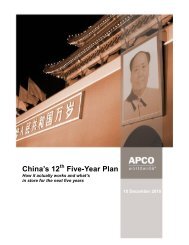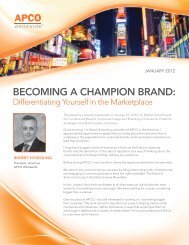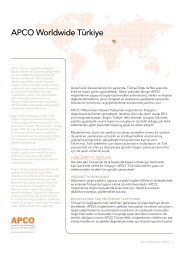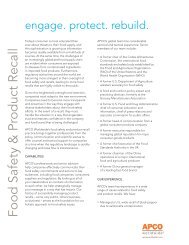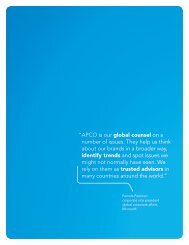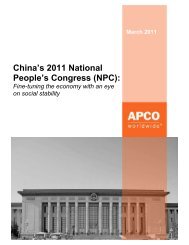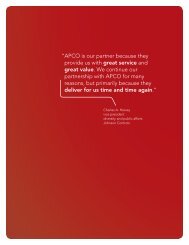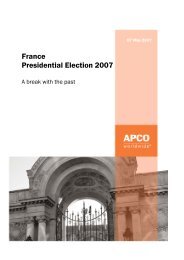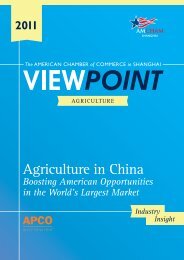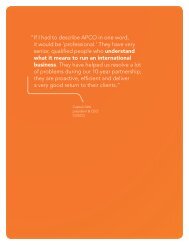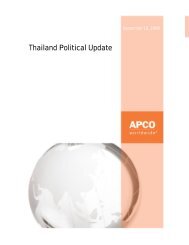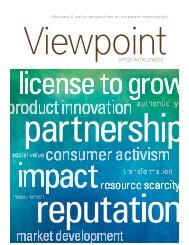Over - APCO Worldwide
Over - APCO Worldwide
Over - APCO Worldwide
You also want an ePaper? Increase the reach of your titles
YUMPU automatically turns print PDFs into web optimized ePapers that Google loves.
30<br />
BEST PRACTICE<br />
Short-term damage<br />
to corporate reputation<br />
is often significant, but<br />
long-term damage is usually<br />
incalculable. Margery Kraus,<br />
president and CEO of <strong>APCO</strong><br />
<strong>Worldwide</strong>, insists that<br />
modern companies must<br />
embrace corporate social<br />
responsibility and be<br />
proactive, rather<br />
than reactive.<br />
<strong>Over</strong> the past few years, much has<br />
been written about the price of<br />
corporate fraud and scandals.<br />
From Ponzi to Parmalat there is one constant<br />
theme: corporate scandal is expensive. The<br />
headlines have shown us that a business<br />
model of ‘profit at any price’ carries<br />
crushing costs for the CEO, the company,<br />
its employees and the entire community.<br />
In many cases, just the threat of scandal<br />
is enough to send the stock plummeting.<br />
Fortunately, few companies are<br />
confronted by the challenge of outright<br />
fraud and abuse, but corporate reputations<br />
are tarnished by the sins of the few.<br />
Governments respond to corporate scandals<br />
by imposing new layers of rules and<br />
regulations on all business. Even the most<br />
pristine corporations are required to spend<br />
millions complying with the new laws, and<br />
there is little indication that these new laws<br />
have generated goodwill or reassured the<br />
public or stockholders. It has become<br />
clear that following the rules is only<br />
the starting point for a company to<br />
build and retain the trust of its shareholders,<br />
customers, employees and other<br />
stakeholders. Enlightened companies<br />
are changing the way they view their<br />
role in the world and the ways in<br />
which they communicate.<br />
Code of conduct<br />
Corporate social responsibility (CSR)<br />
has come to play an important role in<br />
these changes. Once thought of as an<br />
inspirational concept, CSR is based on facts<br />
and figures, the policies and practices and<br />
the impact a company has on ‘people and<br />
the planet’. A quality social responsibility<br />
programme has become an expected<br />
practice of good management and corporate<br />
governance. CSR is now considered to be a<br />
DO THE<br />
March 2005 Volume 1<br />
key measure of a company’s reputation.<br />
While not all investors have made the<br />
link between corporate value and CSR,<br />
there are numerous examples that CSR<br />
has not only become a fundamental part<br />
of corporate reputation, it has also been<br />
contributing to corporate value.<br />
With the activism of regulatory bodies<br />
in an increasingly litigious world, the only<br />
certainty is that the unexpected will happen.<br />
Shining up the coin of corporate reputation<br />
does not come about because of a press<br />
release. It comes about because of the way<br />
a company treats its employees, the workers<br />
in its supply chain and community members,<br />
as well as its ultimate impact on the<br />
environment. It is not a one-off public<br />
relations effort; it is how you conduct<br />
business. It is not just a matter of putting on a<br />
good public face, but of doing the right thing.<br />
Selling CSR as a corporate reality<br />
has always been difficult. CEOs face<br />
tremendous pressure to meet quarterly<br />
and annual projections, while appeasing<br />
acutely attentive stockholders. For a long<br />
time, companies saw the demand for<br />
growth and profits and the need to build<br />
a strong reputation with the public as<br />
contradictory goals. Corporate structures<br />
contributed to this by separating the<br />
financial side of the business from<br />
the ‘softer’ side, which originally<br />
dealt with the community and other<br />
external stakeholders.<br />
Virtue is its own reward<br />
What the past three years have<br />
demonstrated is that there should be<br />
no conflict between the goals of doing<br />
well and doing good. By finding the<br />
convergence of these two interests,<br />
corporations are melding social<br />
responsibility with the business case.<br />
right thing<br />
CEO • Best-practice solutions for business leaders worldwide • Subscribe for free at www.leading-business.com
The bonus is an enhanced reputation<br />
and incremental value to shareholders.<br />
The way to find the balance between<br />
doing good and doing well comes from<br />
understanding the corporate role in the global<br />
economy. Everyone knows the world has<br />
changed. No corporation stands alone.<br />
American companies routinely outsource<br />
call centres to India and purchase<br />
inexpensive, manufactured goods from<br />
China. The supply chain recognises few<br />
geographic boundaries. The internet and<br />
other technological innovations have made<br />
the world accessible to millions with the<br />
click of a computer mouse.<br />
Governments cannot solve every problem<br />
in isolation. It is becoming increasingly clear<br />
that corporations need to harness their own<br />
economic power to improve conditions<br />
around the world, not because it is altruistic,<br />
but because it is in their long-term interest.<br />
Deep and fundamental social problems<br />
adversely affect the bottom line for<br />
business. Events and conditions half-aworld<br />
away, such as war, famine, drought<br />
or political instability, cost multinational<br />
corporations a great deal of money by<br />
stunting or shutting down markets and<br />
disrupting the supply of raw goods.<br />
A wider sense of perspective<br />
A world where nearly half the population<br />
lives on less than two dollars a day is not<br />
exactly a prime market for personal<br />
computers, designer wear or hybrid cars.<br />
A country where infectious diseases, from<br />
tuberculosis to HIV, approach epidemic<br />
levels is not a place where a long-term<br />
investor will risk his or her money. Rampant<br />
illiteracy can be as bad for business as<br />
rampant political corruption. The CEO of<br />
the future cannot just worry about sales; the<br />
CEO needs to worry about creating and<br />
sustaining markets. The literacy, health<br />
status and political stability of a country<br />
now affect the bottom line as much as<br />
any decision made in the boardroom.<br />
I once heard someone say that there is<br />
no such thing as a successful business in a<br />
failed world. That simple statement captures<br />
the essence of CSR. CEOs must provide the<br />
leadership and corporate assets needed to<br />
develop the policies and practices to move<br />
CSR into the DNA of the business.<br />
Studies conducted in recent years by<br />
A world where nearly half the population lives<br />
on less than two dollars a day is not exactly<br />
a prime market for personal computers<br />
<strong>APCO</strong> Insight®, <strong>APCO</strong> <strong>Worldwide</strong>’s<br />
in-house research group, show that<br />
stakeholders expect companies to be<br />
proactive and go beyond the requirements of<br />
law if they are to be credited as socially<br />
responsible. The most recent survey<br />
shows a majority of key corporate players<br />
have purchased a company’s products or<br />
services, or recommended them to others,<br />
in response to positive news about a<br />
company’s social responsibility. On<br />
the other hand, approximately 60<br />
per cent have boycotted a company<br />
in response to negative news.<br />
Primary concerns<br />
CSR has become a well-known acronym<br />
in the boardroom, but many still dismiss<br />
it as peripheral to the central concern of<br />
business and the investment community.<br />
However, earning the respect and trust<br />
of the public is undoubtedly good<br />
for business. Preserving a pristine<br />
environment will not only avoid future<br />
problems of fines, clean-up costs and<br />
squandered goodwill, but can also build<br />
a partnership with a community.<br />
Each year, corporations spend small<br />
fortunes on public relations and damage<br />
control. Even the best run company can<br />
experience a crisis. The company best<br />
able to weather an adverse situation is<br />
one with a solid public reputation.<br />
A good reputation is the product of<br />
a proactive investment of time and<br />
energy, outreach and partnerships, and<br />
communication with key stakeholders.<br />
The pace of today’s world is so fast<br />
it may seem counter-intuitive to argue<br />
that it is cost-effective for businesses<br />
to take a long and broad view of their<br />
interests. However, forcing self-interest<br />
to coincide with actions that generate a<br />
prosperous and growing marketplace is<br />
simply good business sense. Building<br />
an intrinsic corporate responsibility<br />
programme should become part of<br />
the corporate character, defining future<br />
reputations, because a good reputation<br />
is like a deposit in the bank: to be<br />
built up for the future or drawn<br />
upon for a rainy day. �<br />
CEO • Best-practice solutions for business leaders worldwide • Subscribe for free at www.leading-business.com 31



